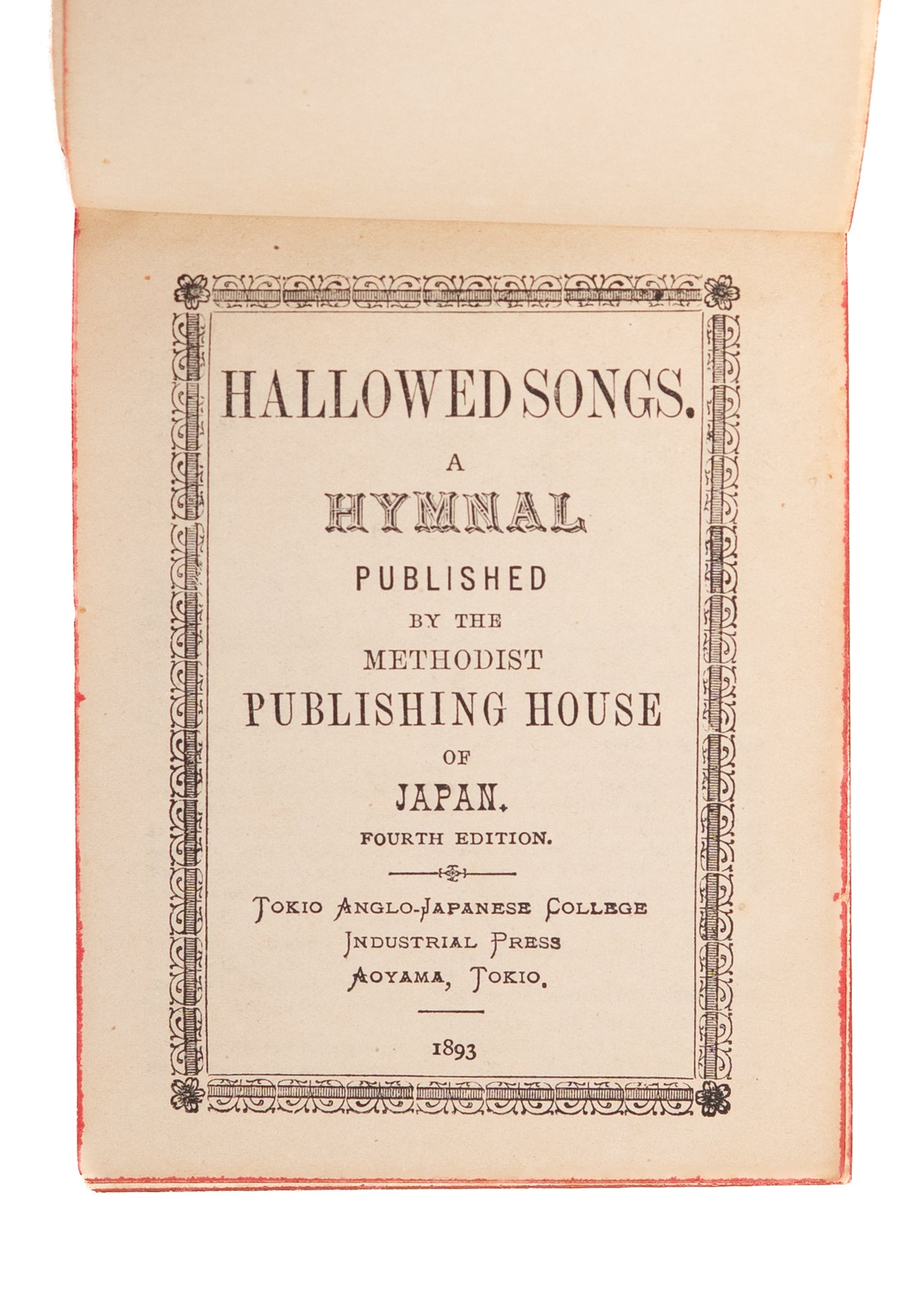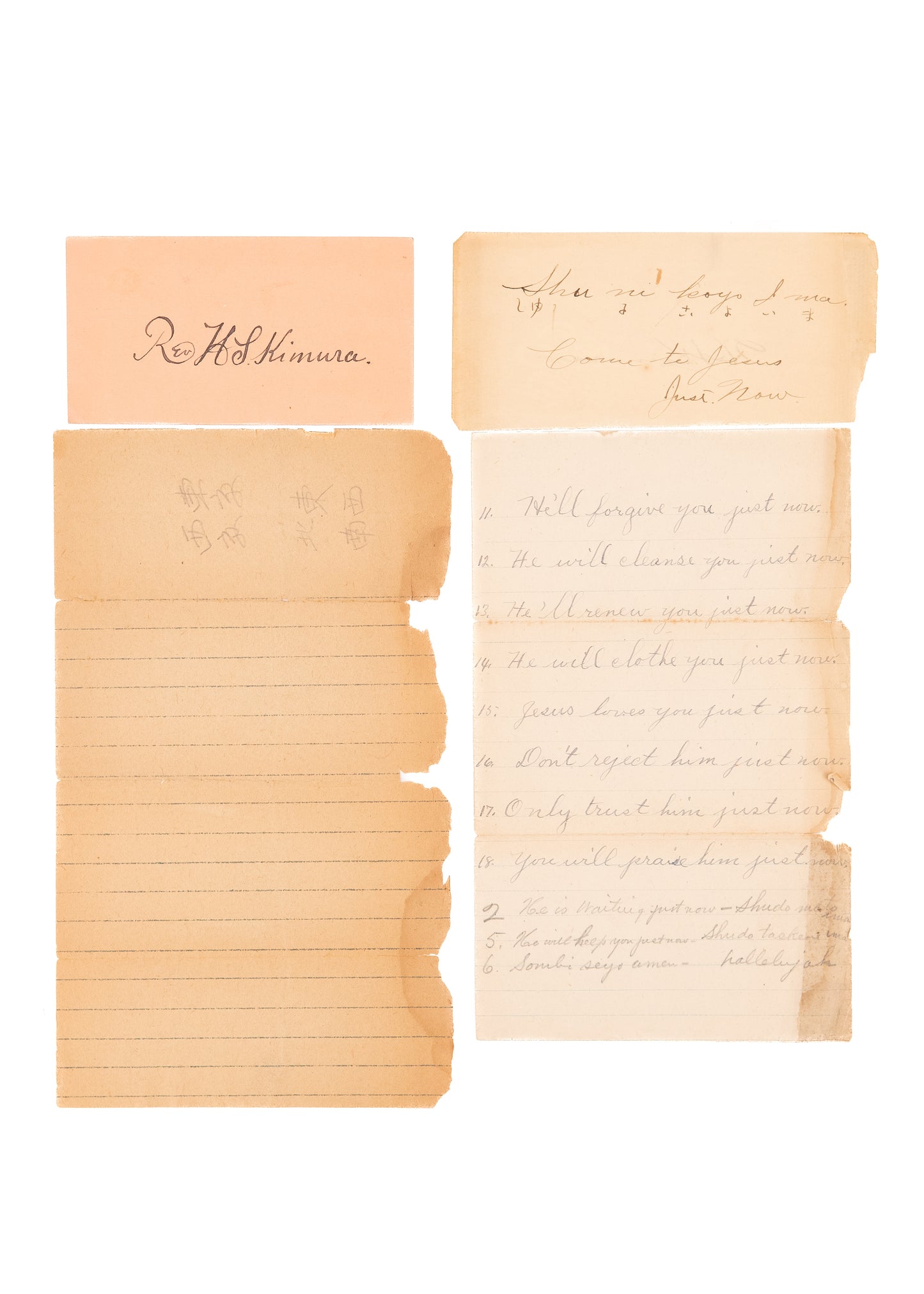Specs Fine Books
1893 JAPANESE BILLY SUNDAY in CALIFORNIA. Small Group of Ephemera Related to H. S. Kimura.
1893 JAPANESE BILLY SUNDAY in CALIFORNIA. Small Group of Ephemera Related to H. S. Kimura.
Couldn't load pickup availability
A fine little group of ephemera related to important Japanese and California evangelist, H. S. Kimura and his work as an M. E. Evangelist in California. The group is comprised of an original Japanese M. E. Hymnal, with no copies traced for sale or at auction, a small autographed slip by H. S. Kimura with the opening line of the evangelistic hymn Come to Jesus, an MSs of the hymn Come to Jesus, a single sheet with a pronunciation key for Japanese Kanji, and a printed business card with the Mission information on the front and Kimura's lithographed signature on the rear.
Kimura Kiyomatsu (木村 清松), known in the United States as Henry Seimatsu Kimura, was born in 1874 to a family of sake brewers in Gosen City, Niigata Prefecture. At seventeen Kimura was baptized during an evangelistic service held by Teiichi Hori in Niigata. His conversion to Christianity led to conflict within his family, especially with his father, who disowned him
After the fall-out over his conversion, Kimura left home to attend Tohoku Gakuin University. In 1894, seeking further Christian education, Kimura sailed for the United States. Arriving in San Francisco, Kimura briefly joined the Salvation Army before leaving to study at the Methodist Episcopal Church’s University of the Pacific in San Jose. During his studies, Kimura served with the Methodist Japanese Mission in San Jose, as well as traveled to preach at Japanese churches throughout northern California.
When D. L. Moody visited California on a speaking tour in March 1899, Kimura sought out the famous evangelist. Impressing Moody with his conviction for Christ and his sheer persistence, Moody sponsored Kimura’s further education at the Moody Bible Institute (MBI) in Chicago.
After two years at MBI, Kimura returned to Japan in 1901, beginning a fifty-year ministry across Japan, China, and the South Pacific. Along with pastorates at Kyoto’s Rakuyo Church and Osaka’s Minami Church and Tenma Church (among others), Kimura served as an itinerant evangelist for the United Church of Christ in Japan.
In 1914, Kimura visited the U.S. and encountered a Billy Sunday Campaign in Denver, Colorado. Captivated by Sunday’s dynamic delivery and urgent message, Kimura returned to Japan with a new vision for evangelism inspired by the popular American evangelist. An October 1915 issue of The Christian Register characterized Kimura as the new “Japanese Billy Sunday”:
“A great tent which he secured he pitched in the immediate vicinity of the houses of parliament in Tokyo, and there he has been preaching since, engaging the constantly increasing attention of the people of Tokyo…. Like Sunday, he rushes back and forth across the platform, gesticulates widely, twists and crouches in dozens of extreme attitudes, and shouts out his accusations, challenges, and invitation with intense force. Sometimes when his voice fails he uses a megaphone. The Japanese language apparently does not admit as much scope for slang as there is in American speech, but Kimura goes as far as he can in that direction, and puts his message continually in the vernacular of the streets.”
Just as Billy Sunday encountered criticisms for allegedly promoting superficial conversions on his “Sawdust Trail,” H. S. Kimura’s tent revivals in Japan also drew skepticism from some Western missionaries and Japanese pastors. His approach to theology and his popular evangelistic methods sparked further debate in 1918 with his participation in Japan’s “Second Advent Movement,” a brief but influential revival movement centered on Biblical prophecy and the imminent return of Christ.
Anonymous. Hallowed Songs. A Hymnal Published by the Methodist Publishing House of Japan. Fourth Edition. Aoyama, Tokio. Tokio Anglo-Japanese College Industrial Press. 1893. 223pp.
A good + copy, bound in wraps, generally solid, with generally bright pages.
Share












